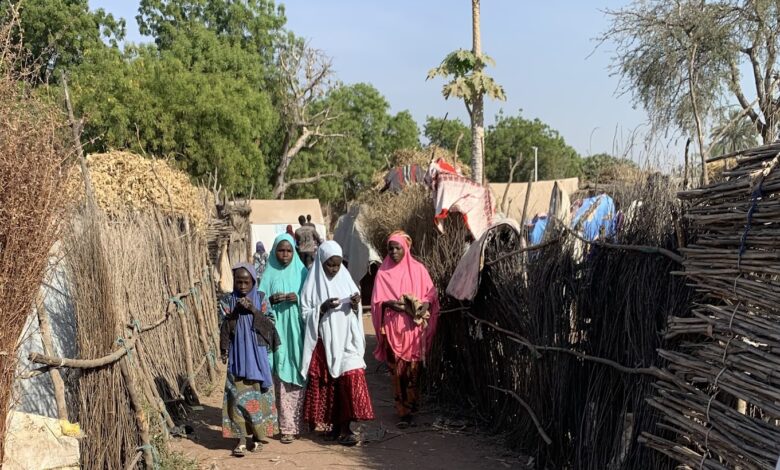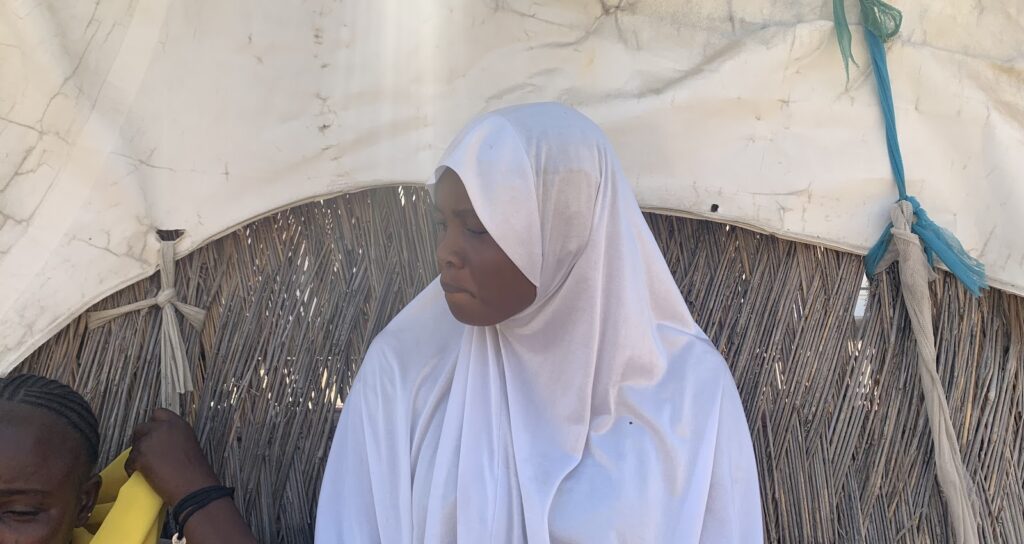IDPs In Nigeria’s Adamawa State Anticipate Resettlement
News of resettlement sparks hopes of a better future for displaced persons in Adamawa’s Malkohi camp.

“No one here would tell you they are not tired of staying in this camp,” Naomi Daudu tells HumAngle while seated beside her makeshift tent in Malkohi displacement camp.
In 2014, Naomi, now 27, found her way to Malkohi IDP camp located in Yola, Northeast Nigeria, after terrorists from the Boko Haram terror group attacked her village in Mubi Local Government Area in Adamawa state.
During the first three years of her displacement, Naomi tells HumAngle, donations by aid organisations and the state’s emergency management agency (ADSEMA) were frequent. In the past two years, however, the distribution of relief supplies has become a once-in-a-blue-moon occurrence.
However, in 2021, the International Organization for Migration (IOM), in collaboration with the United Nations Office for the Coordination of Humanitarian Affairs (UN OCHA), began a project that aims to improve the local integration of displaced people in the state, and the reintegration of Nigerian refugees who have returned from Cameroon.
“This includes shelter, livelihoods, water, sanitation, hygiene, safety, education, health care and more,” the OCHA states.
There are over 1,200 displaced persons currently living in Malkohi camp, according to the camp’s chairman, and the majority of them fled from the northern senatorial zone of Adamawa, where insurgent groups still hold sway.
“There has been hunger alongside other hardships in this camp,” Naomi says, but when officials of IOM visited the camp with news of resettlement, it ignited a sense of hope within the camp, she added.
“They came, gathered us all and asked who wanted to be resettled in Labondo. Many of us raised our hands,” Naomi explains, noting that the officials collected their biodata, counted households, and asked the displaced people what skill they wanted to learn while at their new place.
“This happened last year after the rainy season. We were all excited that the next rainy season, which was this year’s, would not meet us here, but it did.”

Resettlement efforts in the northeast.
Tales of displaced persons’ resettlement have only been noted in neighbouring Borno state, where it has been championed by the state government.
Last year, the Borno state governor, Babagana Zulum, began shutting down camps in Maiduguri and resettling displaced persons in resettlement sites located in “safer” territories. According to Zulum, the reasons for resettling IDPs include the prevalence of drugs and substance abuse in the camps, prostitution and child marriages, street begging, and growing dependency on donations.
However, these efforts have received grave backlash especially from the international community, who fear that resettled IDPs could be at risk of terror attacks and human rights violation.
In October, displaced persons who have been resettled in Nguro Soye community in Borno told HumAngle that their transfer to a new location had not improved their situation, describing it as ‘second displacement’.
Looking forward to a better life in the Labondo resettlement site.
Although the resettlement effort in Adamawa is not funded by the state government like Borno’s, IDPs remain optimistic about a new way of life with improved living conditions.
Labondo is a community in Girei LGA of Adamawa. According to a report published by the UN OCHA, 450 displaced and vulnerable families will benefit from the ongoing construction of the settlement.
“In addition to a new home, they will receive 216 square metres of land to use however they see fit, such as for agriculture or to build additional structures,” the report states, adding that classrooms, health centres, and a market are also being constructed and will serve both host communities and the displaced persons including returning refugees.
Hauwa Muhammed, 37, who was also displaced from Mubi eight years ago, tells HumAngle she looks forward to living in a constructed house with windows and doors.
She says living in a tarpaulin tent has been her biggest challenge, asides the lack of nutritious food, “when the weather is hot, it is unbearable to sleep, when it is raining, we do not sleep because our entire room becomes wet and flooded.”
The mother of five added that she hopes to move before the next rainy season and also anticipates enrolling her children in the resettlement site’s school.
Support Our Journalism
There are millions of ordinary people affected by conflict in Africa whose stories are missing in the mainstream media. HumAngle is determined to tell those challenging and under-reported stories, hoping that the people impacted by these conflicts will find the safety and security they deserve.
To ensure that we continue to provide public service coverage, we have a small favour to ask you. We want you to be part of our journalistic endeavour by contributing a token to us.
Your donation will further promote a robust, free, and independent media.
Donate HereStay Closer To The Stories That Matter




